#software for game development
Explore tagged Tumblr posts
Text
How to choose a fantasy sports game app development company?
The gaming industry has significantly boosted sports. Hence, the US market will have projected nearly 91.0 active million players by 2027. After understanding the market size it is capturing, it becomes essential for anyone who wants to enter the market to choose a great sports development business partner to leverage their users' experience to a new level.
#game development services#software for game development#mobile game development companies#game app development company
0 notes
Text

#Sega ST-V Development Disk#SEGA#1995#Sega ST-V#software#tech#design#arcade gaming#retro gaming#video games#90s#1990s#90s arcade gaming#@suddendesu
44 notes
·
View notes
Text

i got an old laptop from my grandpa and was googling about it, and the wikipedia page for the micro-soft acer aspire has an image of the acer aspire with the wikipedia page, containing the image of the acer aspire with the wikipedia page, containing the image of the acer aspire with the wikipedia page, containing the image of the acer aspire with the wikipedia page, containing the image of the acer aspire with the wikipedia page, containing the image of the acer aspire with the wikipedia page, containing the image of the acer aspire with the wikipedia page....
#programming#game development#coding#codeblr#codex#developers#software engineering#code#old web#old internet#old computers#computing#computer science#computer#antique#fandom wiki#wikipedia
191 notes
·
View notes
Text

IM COOKING SO HARD RN, IT FEELS LIKE IM GONNA BE DONE IN TIME, HOLY SHIT
This is my first time doing genuine pixel art istg. OBV ITS NOT DONE YET BUT LIKE???
#my art#artists on tumblr#art#original character#utdr fandom#utdr#furry sona#sona art#unity2d#unity#undertale art#undertale fanart#software development#coding#game development#pixel art#pixel game
24 notes
·
View notes
Text
HELP WANTED: LITTLEBIGPLANET FAN MOVEMENT

For the past year or so I’ve been working on a fan movement to revitalize interest in LittleBigPlanet on Sony’s terms. Think it comparable to Operation Moonfall, a fan movement for revitalizing interest in The Legend of Zelda: Majora’s Mask, which eventually led to its 3D Remake.
While I can’t promise the plan I’ve set out is guaranteed to result in a new LBP game, I do believe that it is also the best opportunity for one to be made. However, as I’ve worked behind the scenes I’ve found it impossible to maintain on my own. Therefore I must ask for help.
Operation Mushroom Tree, as it is tentatively titled, involves the creation of a professional pitch for a new LittleBigPlanet entry for modern consoles. This pitch would provide a basic outline of what a new entry would entail, and prove why the franchise would still be popular.
The goal is not to make a wishlist nor a whole new installment on our own, but a feasible design concept for a new game that the community can rally behind. While this exact pitch may not be directly used by Sony Interactive Entertainment, Operation Mushroom Tree would be a template to guide development of a new game. The design document at the forefront would show the best way to make a new installment in a way that would be enticing to shareholders and employees of Sony Interactive Entertainment, the current rights holders.
The document has been mainly continuously written by me. However, I am just beginning my journey into game development, and this project would be unsustainable on my own. I need concept artists and render artists to create mockups of believable illustrations of the game Operation Mushroom Tree provides. As well, I’d sincerely love the second opinions of other game designers who are passionate about the LBP franchise. Finally, I have only a very rudimentary idea of how LBP works on a programming and hardware level, and thus this project would benefit from an expert on such.
To be precise, I am looking for:
- 3D Modeling or Photoshop Artists to create renders and mock-ups of gameplay mechanics.
- Individuals with history in Game Design and have a fondness for the LittleBigPlanet Franchise, mainly to help write and guide the main design document.
- Individuals who have intimate knowledge of the LittleBigPlanet franchise on a hardware and software level, and can evaluate the feasibility of certain features on modern hardware.
If you or anyone you know falls into these categories, please contact me through Tumblr. If you are not in these categories, but are interested and believe you are able to help with this campaign, please contact me as well, and hopefully we can find a way to work together still. Do please provide some evidence of your past work and knowledge with your message.
I know that many out there currently are disappointed with the treatment of the LBP franchise after 2024, as am I. However, I do believe that LittleBigPlanet could thrive in today’s landscape, and would be beneficial to the games industry as a whole. Therefore, I am willing to embark on this journey, not only to entertain fans, but to help support up-and-coming developers get their first steps, as LBP did for me.
#little big planet#playstation#sony#lbp#game design#programming#3d modeling#sackboy#lbp2#lbp3#fan movement#help wanted#hardware#software#game development#dualshock#sony playstation#ps5#ps4#ps3#retro gaming#2000s nostalgia#sackgirl#british#media molecule#sony interactive entertainment
18 notes
·
View notes
Note
Is direct console development (for a multi-platform title) only about certification requirements and console specific bug fixing, or is there more to it?
There's two sides to console development. There's the software certification side, which is what you asked about - all of the cert requirements and fixing console-specific and certification bugs like using the proper glyphs, using the copyrighted terms, and so on. The other side is actually setting up the software at the engine level to interface with the hardware drivers and utilize the game hardware. This tends to be the really crunchy programming work done by senior software engineers who really love playing with hardware.

All software needs to interact with the actual hardware at some point - there must be data sent to the hardware and the hardware has to operate on those data. There are often many layers of abstraction between the hardware and the software - most programmers don't need to think about how the math is done, only that the math is done. It's the experts who work with the hardware that do what they can to squeeze additional performance out of that hardware in the time they have allotted to do so.

One such example would be back in the PS3 days. The PS3 famously had a bunch of "synergistic processing units" (SPUs) that could do a bunch of math very quickly, but required a special half-float format to operate. Most game dev teams didn't bother to utilize those SPUs for that reason - it took a lot of additional effort to set up the software to store data in that format, send them to the SPUs for calculation, and then convert those data back to the normal floating point precision numbers we usually use. Some teams like Naughty Dog's Uncharted team, however, took full advantage of the SPUs and used them for the post-processing effects to make Uncharted 2 look so good.

This is the other side of console development - writing code to take advantage of the specific hardware bells and whistles and squeezing out better visuals and performance from the hardware that's waiting to be used.
[Join us on Discord] and/or [Support us on Patreon]
Got a burning question you want answered?
Short questions: Ask a Game Dev on Twitter
Short questions: Ask a Game Dev on BlueSky
Long questions: Ask a Game Dev on Tumblr
Frequent Questions: The FAQ
9 notes
·
View notes
Text
Gonna work on this.
with Benny.
It's about 3PM British time.
2 hours.
Time me gentlemen.
47 notes
·
View notes
Text

UK 1998
#UK1998#DISNEY SOFTWARE#EUROCOM DEVELOPMENTS LTD.#ACTION#LICENSED#IBM#PS1#DISNEY'S HERCULES#DISNEY'S ACTION GAME FEATURING HERCULES
31 notes
·
View notes
Text
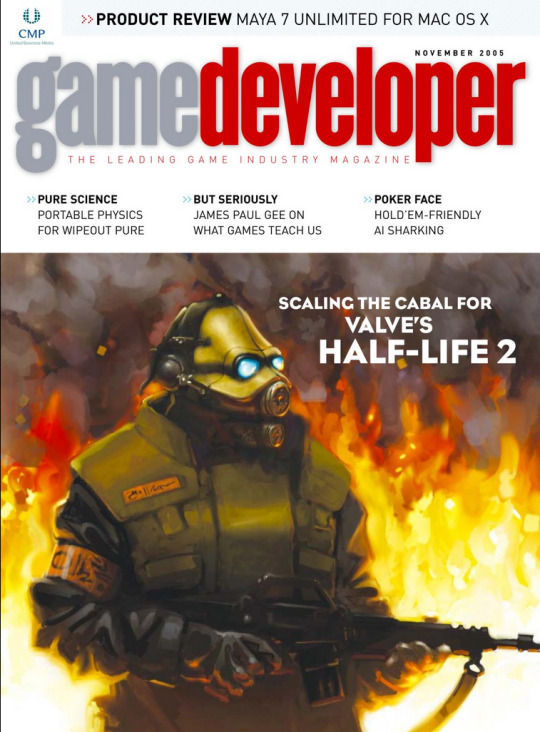
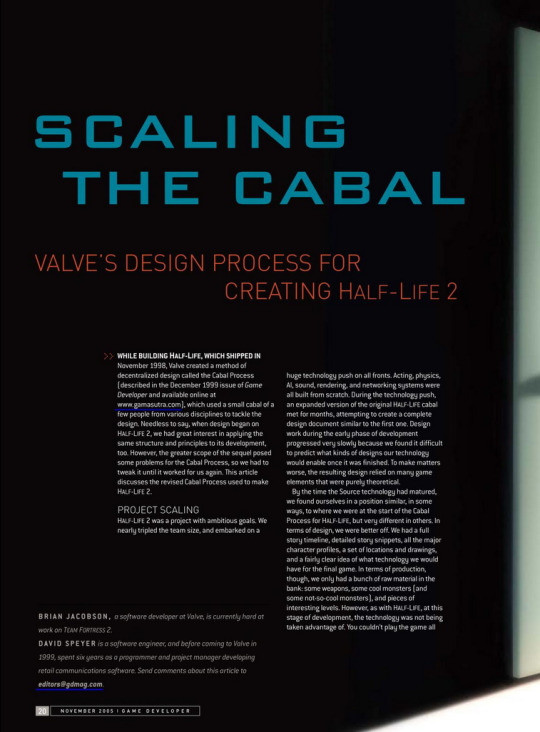



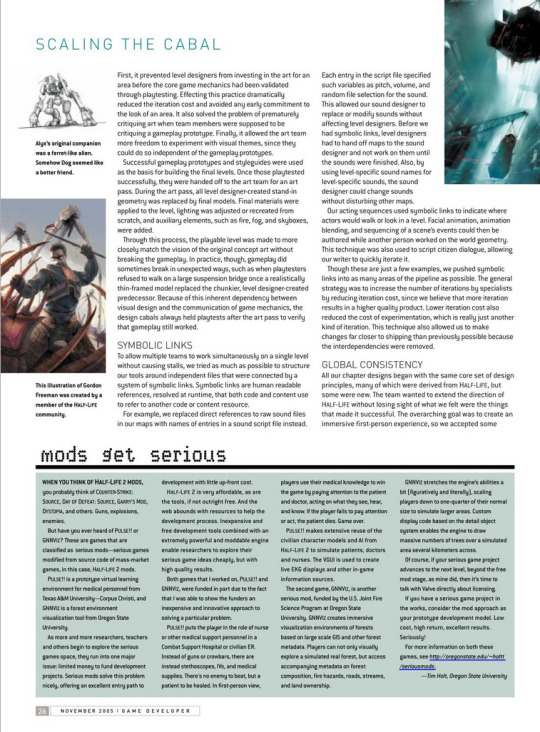
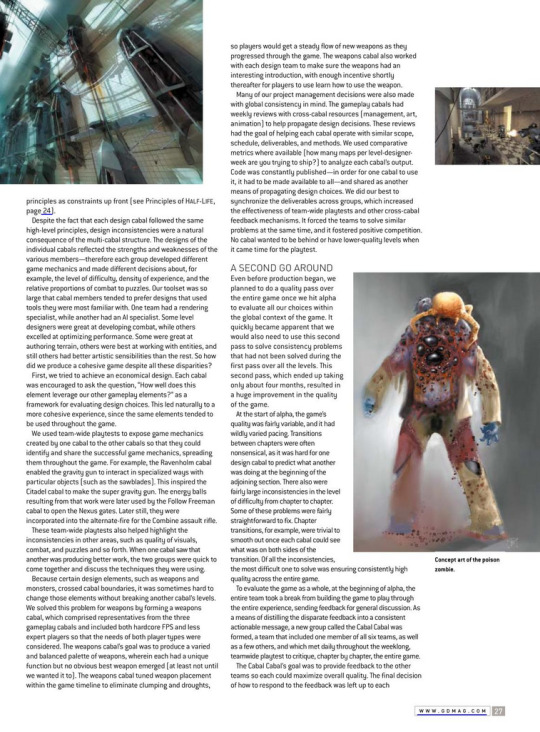

" Scaling the cabal : VALVe's design process for creating Half-Life 2! "
Game Developer Magazine (GDM) - November, 2005.
#VALVe#VALVe Software#Sierra#Sierra Studios#Half Life#Half Life 2#Hl2#HL Concept Art#Concept Art#Game Development#Hl2 Gordon#Gordon Freeman#Hl2 Gman#Gman
78 notes
·
View notes
Text
Pirate Software's "rearchitecture" for Stop Killing Games
There's been a lot of fascinating drama around Stop Killing Games. Go read the initiative here:
It is a good initiative, and anyone who is a consumer that can, should absolutely go support it.
Jason "Thor" Hall, CEO of Pirate Software, recently had a few, let's say, "takes" on the matter (I'm trying and failing to remain neutral), which began on a stream. The stream's VOD has since deleted on his YouTube channel.
Louis Rossmann, who you might know as the largest Right to Repair activist in the US, made a response to a section of the releevant stream here:
youtube
Thor, CEO of Pirate Software, made two videos to clarify his points:
youtube
There is an argument in the video at the 2:08 mark that I will reference later.
youtube
(I recommend watching all these videos on 2x speed. You will get the same info out of them all, because especially video 2 is a lot of repetition)
Now, as mentioned above, there is one particular technical argument that bugs me about what Thor, CEO of Pirate Software, is making. Here is the full quote:
How would you keep League of Legends in a functional, playable state? You'd have to rearchitect the entire game. The game is what is called "client-server". So, in client-server models, there's a server, there's a client, and all of the math, all of the game, everything happens on the server. The client just displays it. And the reason we want to do it that way is so that you can't teleport around and do a billion damage. You don't trust the client. You trust the server. The client just displays what it's told. Right? So, if we wanted to rearchitect this, we would have to take all of that server logic, push it back out into the client, and somehow make that playable in a multiplayer-only video game. That doesn't make sense to me. So this doesn't work for all games. Why is [the initiative] calling out all games?
So, first off, yes, most games do client-server architecture for multiplayer logic, because you do trust the servers. It is an important step to curbing an entire class of cheats. It doesn't necessarily mean the client isn't malicious (for example, there are cheats for League of Legends that show a growing circle when an enemy leaves the fog of war in the minimap). However, it does mean the client doesn't know 100% of the game at any time when information is selectively fed to each client based on something like the fog of war. That's awesome.
Some games, like PlanetSide (rest in peace) and Overwatch (2) use what's called client-side hit detection. Some games, like Halo 1, employ more selective hit detection models, where only certain weapons use client-side hit detection (see https://c20.reclaimers.net/h1/engine/netcode/). Client-side versus server-side hit detection can change the overall feel of a game, and it's one of the things game developers decide on in multiplayer-only games that require it. In the case of an massively multiplayer online first person shooter (MMOFPS) like PlanetSide (2), the server simply can't calculate thousands of people's math in a reasonable amount of time, because otherwise the hit detection would otherwise feel very crappy to play, and so the math is offloaded to the client and the client says "hit" when they hit.
However, there are a few counterexamples to the specific technical argument that keeping the game playable after end-of-lifing it requires rearchitecting:
Games with dedicated servers exist - Command & Conquer: Renegade, Starsiege: TRIBES
Games where one client also hosts the multiplayer server exist - Half Life 2, Warhammer 40k: Space Marine
Private server hosting exists - World of Warcraft
Some of these games, particularly the examples with dedicated servers that can be run on user hardware, can also run as the second example.
To say keeping a multiplayer-only online game requires rearchitecting a game like League of Legends means a lack of imagination. More relevantly, it means a lack of systems thinking.
To me, it is very strange for someone such as Thor, CEO of Pirate Software, who is self-described as being a 20 year veteran of the games industry to say. I won't say skill issue, because I think there is an ulterior motive at play.
Just to hammer the point home, I drew up some crappy diagrams in Inkscape because this extremely wrong technical argument bugged me so, so much.
Here is what a client-server model looks like:

Here, you have 10 clients, each being a player of the game. Then, you have the server, run by Riot, the developer and maintainer of League of Legends.
Here is the imagination of Thor, CEO of Pirate Software, had to say on the matter on the required way rearchitect it:

Those who know their network models would understand this looks very much like a mesh network, or a peer-to-peer model. And, to be fair, some games might attempt it.
However, this isn't *usually* how games described using a peer-to-peer (P2P) model work. Most peer-to-peer models, like the architecture used in Space Marines, are often used for matchmaking. Once you are in a game, one of the clients also serves as the host (selecting by some algorithm, like randomly or whoever has the best hardware).
P2P is nice, because the company doesn't have to run servers for matchmaking at all during their lifespan (and sometimes a matchmaking server might be spun up to serve as a relay to help with network issues or help other clients find clients quickly). As we'll get into later, a client machine will also serve as the host machine. It is a perfectly fair and valid, although it comes with it's frustrations (mainly in the realm of network address translation (NAT) traversal, because your computer behind a router is not usually exposed to the wider Internet, though sometimes routers have universal plug-and-play (UPnP) set up, which makes NAT traversal much easier here).
If you've ever seen a message in the game "migrating host" because the host left, they likely use P2P matchmaking, but still use a client-server model. They can just migrate the game data to a new host using the data on the other clients as a seed for the data.
This is likely their setup for actual gameplay:

One of the clients now has a server on the same machine. Sometimes, this could be the game itself that would serve in singleplayer. However, most often, this is just a server that's lightweight enough for the client to connect to and they play that way (it's also really nice to develop and QA this way, because many server bugs will also be seen by the client).
Now, one of the disadvantages here is: Can all remote clients connect to the host that the server (and one of the clients) is running on? Again, NAT traversal issues usually play a role here. In the first few days of any game that uses this, and only this, there will likely be a lot of issues with connectivity.
Another disadvantage: The host won't have latency issues. This is why in the case of, for example, Among Us, the client host can see certain things happening (like someone is dead the moment they hit a button or reported a body), but remote player hosts might not.
Okay, so, maybe it's not possible to rearchitect something like League of Legends like this. It could reasonably be a lot of work. Here is another solution:

Looks very similar to the first architecture, doesn't it? It is! The difference is that the text "Riot" was changed to "not Riot".
This is how World of Warcraft and Pokemon Go private servers work.
The vast majority of games that would not run without private servers simply do not require rearchitecting to keep in a reasonably playable state when the servers shut down.
#stop killing games#pirate software#software architecture#software development#multiplayer game development#Networking#League of Legends#Among Us#PlanetSide#Starsiege: TRIBES#TRIBES#Half life 2#World of Warcraft#Pokemon Go#Warhammer 40k: space marine#command & conquer: renegade#Youtube
40 notes
·
View notes
Text
Current game build running in a standard 80x24 virtual terminal on my work computer (ubuntu 20.04)
the game is written in my langauge Matte (https://jcorks.github.io/matte/doc-quick.html), but all it uses are C printfs for the graphics
73 notes
·
View notes
Text
Coding tutorial: Chain-of-responsibility pattern
A peasant, knight and king walk into a software design tutorial, and are here to teach you the chain-of-responsibility pattern. Learn how to create a chain of handlers which can handle different request types.
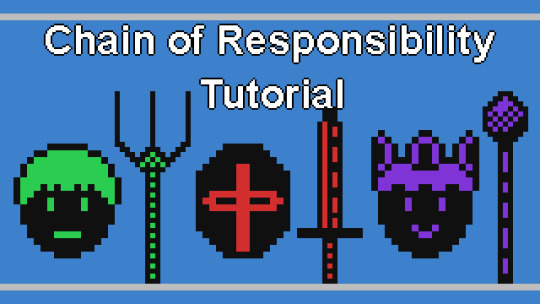
This tutorial shows you how to code the chain-of-responsibility pattern in the Visual Studio development environment, using a console application and the C++ programming language.
The chain-of-responsibility pattern passes on a request to a chain of handlers one at a time. Each handler can handle different requests. So if the first handler can’t handle the request, then it will pass it on to the next handler. Once a request is handled, the chain ends. Since there is no longer a need to pass on the request.
It is also possible that the request doesn’t get handled by any of the handlers. Since each handler can handle 0, 1 or many requests of different types.
See the full tutorial here.
Console output:
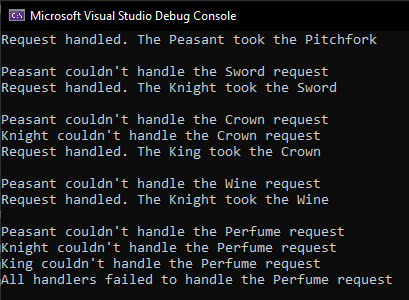
#cpp#coding#programming#gamedev#indiedev#tutorial#visual studio#software#software design#software development#game development#design patterns#cppprogramming
20 notes
·
View notes
Text

#Tecnosoft#テクノソフト#株式会社テクノソフト#Nagasaki#Kyushu#Japan#retro gaming#video games#store front#signage#game dev#game development#software#サンダーフォース#Thunder Force
29 notes
·
View notes
Text
The amount of people not buying a Switch 2 on launch gives me hope that there won't be any shortage/supply issues when it releases.
#nintendo#jacob blogs#everyones out here talking about how this console is going to sell over a million units the day it's released#like how?? if everyone's gonna basically boycott this next generation??#i mean i guess it would be worth it if it means the console drops $100 in the first year#idrc#im not a business owner#but ninty nickle and diming us over consoles hardware and software#is wayy more permissible in my eyes#compared to the dozens of game developers and publishers#that push for predatory microtransactions in unfinished games#and yearly releases of games with updated cosmetics and unecessary season passes
9 notes
·
View notes
Text
“Game Development can’t be that hard”
Game Development:
14 notes
·
View notes
Text
in a lot of ways i feel like i should have gotten a different degree because i feel as an adult my interests are much more creatively driven. but the culture insists that you decide your fate at age 17-19 and then have to stick with it for the rest of your life
#i have a software engineering degree#i was going to actually go for game development but my mom convinced me to go broader bc she thought i could get pigeonholed and not find a#job. and i mean she’s probably right. and the game dev industry is Terrible#but i actually would have in retrospect gone for a third option. something either heavily database related OR#something that has nothing to do with computers at all. like a degree that would get me a job at a zoo or aquarium#i feel like i’d get more fulfillment out of that. but perhaps i am just feeling meh because i feel like#so behind on knowledge in tech compared to my coworkers because i don’t really have any outside of work interest in doing this kind of thing#for the most part. like maybe if i worked less than 40 hours a week i would#but i already spend so much time sitting at my desk that it’s like the last thing i want to do when i am off work#i much rather spend time with my gf and my dog. go on walks. do crafts.#but it feels sometimes like in tech you have to be obsessed with it and do it 24/7. like the culture is so. This Is Your Life#but to me it is Just A Job. and i feel like you’re kind of punished for that in this industry
6 notes
·
View notes